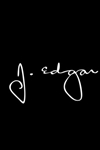- REVIEW
- READER REVIEWS
J. Edgar
|
(No longer in theaters)
|
|
Genre
Drama
Producer
Clint Eastwood, Brian Grazer, Robert Lorenz
Distributor
Warner Bros. Pictures
Release Date
Nov 9, 2011
Release Notes
Limited
Official Website
Review
We hear the voice first, high-pitched, the vowel sounds swerving between Boston and Brooklyn, neither of which was home to FBI director J. Edgar Hoover. It’s not a promising start for Leonardo DiCaprio in J. Edgar, and the first appearance of his face, egregiously rubberized to age him decades, adds to the element of camp. Who’ll be playing Eleanor Roosevelt�Kristen Wiig? DiCaprio is a good, sometimes great naturalistic actor, but his transformations have always been hit-or-miss, and the opening of Dustin Lance Black’s script could be a biopic parody. When Hoover began to dictate his memoirs (�It’s time to tell my side of the story!�), I was embarrassed for the actor. Is Hoover meant to seem so stiff and ludicrous?
It turns out that he is, in part, having hidden his true, homosexual nature for so long that he’s phony through and through. The thrust of J. Edgar is that many of the U.S. government’s most dangerous tendencies�among them flagrant disregard for civil liberties�are rooted in a closeted gay man’s terror of being exposed, especially to his mother. From that terror came Hoover’s obsession with ferreting out other people’s secrets, amassing private files on presidents and using them as leverage to remain in power. And the man who made sure that his bureau projected an aura of manly fitness struggled with the impulse to sashay around the house in dresses and pearl necklaces.
You might wonder: �Who is the gay, pinko, subversive director behind this Tommy-gun assault on our national security and masculinity?� Clint Eastwood, of course. J. Edgar is the latest chapter in Eastwood’s never-ending project to deconstruct the macho, jingoist, homophobic, right-wing archetype he once embodied�and prove himself an artist whose simplicity of style belies the most sophisticated understanding of the dual nature of the American character of any living filmmaker.
That’s the theory, anyway. It’s too bad J. Edgar is so shapeless and turgid and ham-handed, so rich in bad lines and worse readings. Not DiCaprio, though: As you get used to (and correct for) his artifice, you appreciate his guts and honesty. There’s something appealingly straightforward about the way he physicalizes Hoover’s inner struggle, the body always slightly out of sync with the mind that vigilantly monitors every move. The same can’t be said, alas, for Armie Hammer as Hoover’s beloved Clyde Tolson. He’s fine as the smugly entitled pretty boy but hopeless under speckled makeup that makes him look more like a burn victim than a senior citizen. Is there a merit badge for self-effacement? Give it to Naomi Watts as Hoover’s lifelong secretary, who has few lines but is frequently held in the frame so we can register her conflict between loyalty to her boss and to the Constitution of the United States.
Direction this ponderous exposes all the contrivances in Black’s script, like surrounding the aged Hoover with agents who, while taking dictation, interrupt to query the legality of his methods. Those damn liberals are everywhere! The bleached-out scenes in the teens, twenties, and thirties strongly suggest that God had yet to invent color�but late in the film there’s a postmodern twist that reveals our narrator as unreliable. With direction as unvaried as Eastwood’s, you can’t tell what’s purposefully bogus and what’s inept. And does Black’s gay through line get in the way of the story? Apart from one derisive line about Joe McCarthy, there’s nothing about HUAC or the blacklist, when the FBI and Congress worked hand in hand to trash the First Amendment.
I did love Judi Dench as Mrs. Hoover, who at one point announces, �I’d rather have a dead son than a daffodil for a son��to which J. Edgar replies, �Yes, mother.� A carriage that formidable would scare anyone straight.
